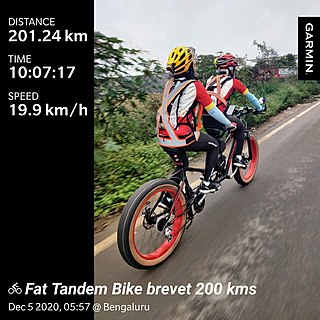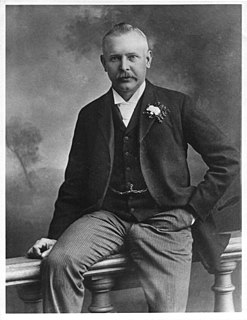Related Research Articles

A bicycle, also called a bike or cycle, is a human-powered or motor-powered, pedal-driven, single-track vehicle, having two wheels attached to a frame, one behind the other. A bicycle rider is called a cyclist, or bicyclist.

The tandem bicycle or twin is a form of bicycle designed to be ridden by more than one person. The term tandem refers to the seating arrangement, not the number of riders. Patents related to tandem bicycles date from the mid 1880s. Tandems can reach higher speeds than the same riders on single bicycles, and tandem bicycle racing exists. As with bicycles for single riders, there are many variations that have been developed over the years.

A Derny is a motorized bicycle for motor-paced cycling events such as during six-day and Keirin racing and motor-paced road races. Some riders train behind a derny on the road. The Derny is so-called as it was originally produced by the French Derny firm, but the name Derny is now applied to all small cycle-pacing vehicles, regardless of manufacturer.

Reginald Hargreaves Harris OBE was a British track racing cyclist in the 1940s and 1950s. He won the world amateur sprint title in 1947, two Olympic silver medals in 1948, and the professional title in 1949, 1950, 1951 and 1954. His ferocious will to win made him a household name in the 1950s, but he also surprised many with a comeback more than 20 years later, winning a British title in 1974 at the age of 54.

Frederick Thomas Bidlake was an English racing cyclist of the late 19th century, who became one of the most notable administrators of British road bicycle racing during the early 20th century. The annual Bidlake Memorial Prize, was instituted in his memory. He was a timekeeper in cycling, motorcycling and for seaplane races in the 1930s.
George Herbert Stancer OBE was a notable English racing cyclist of the late 19th century who became one of the most notable administrators of the British Cyclists' Touring Club (CTC) after World War I. He is commemorated by the annual juvenile 10-mile GHS individual time trial championship.

Daniel Albone was an English inventor, manufacturer and cyclist. He invented the first successful light farm tractor, and the Ivel Safety bicycle.

The Road Records Association (RRA) is a British cycle racing organisation which supervises records on the road but not in conventional races. It is one of the oldest cycle sport organisations in the world, formed in 1888.
John Ephraim Sibbit was a British track cyclist who won a silver medal at the 1928 Summer Olympics.

Thomas Edward Godwin (1912–1975) was an English cyclist who held the world cycling record for most miles covered in a year and the fastest completion of 100,000 mi (160,000 km).
The Golden Book of Cycling was created in 1932 by Cycling, a British cycling magazine, to celebrate "the Sport and Pastime of Cycling by recording the outstanding rides, deeds and accomplishments of cyclists, officials and administrators." There exists only a single copy of this compendium of illuminated manuscripts.
Walter William Greaves was a British cyclist who set the world record for distance ridden in a year - despite having only one arm and falling off numerous times. Greaves rode 45,383 miles (73,037 km) in 1936.
Harry Grant was a British racing cyclist who specialised in motor-paced events. He was national amateur champion in 1926, 1928 and 1931. At the time he turned professional in 1932 he held four British amateur track records. He also won many races on the continent and held the world paced one-hour record on three occasions.
Albert Arthur Humbles was an English cyclist who set the world endurance cycling record by covering 36,007 miles during the calendar year of 1932. He broke the previous best mark that had stood since Marcel Planes completed 34,366 mi (55,307 km) in 1911 in response to Cycling magazine's 'Century Competition'. In 1933, Humbles entered the Golden Book of Cycling as the greatest long-distance rider in the world. He rode 36,007 mi (57,948 km) in a year, averaging 100.019 mi (160.965 km) per day for the 360 days that he rode.

Sidney Herbert Ferris was an English long-distance cyclist who broke the records for Edinburgh-to-London, Land's End to John O'Groats, and 1,000 miles in 1937.
Cyril Heppleston was an English cyclist from Bradford who broke the 100-mile, 200-mile and 12-hour competition records in 1937, and was the only man to beat 250 miles in 12 hours in open competition. He was regarded as 'among the greatest English unpaced time-trial riders.

Stanley John Ambrose Cotterell (1857–1939) founded the Bicycle Touring Club at Harrogate, Yorkshire, on 5 August 1878, while he was a medical student. Its headquarters were wherever he happened to be living. By 1883, the Bicycle Touring Club was renamed the Cyclists' Touring Club to open membership to tricyclists.

Cycling at the 2016 Summer Paralympics consisted of 50 events in two main disciplines, track cycling and road cycling. The venues were the Rio Olympic Velodrome for track cycling in the Barra Cluster, and the Flamengo Park for the road cycling disciplines in the Copacapana Cluster. Seventeen events were contested on the track, and 33 on the road.

Francis William Shorland was one of the dominant English racing cyclists of his generation, and triple winner of the prestigious 24-hours race for the Cuca Cocoa Cup that was disputed at the Herne Hill Velodrome. He was a member of the North Road cycling club.
References
- ↑ "Arthur James "Faed" WILSON". CyclingRanking.com.
- 1 2 3 4 The Golden Book of Cycling - Arthur Wilson, 1938. Archive maintained by 'The Pedal Club'. Archived 28 July 2011 at the Wayback Machine
- ↑ "North Road 50 - 1886". CyclingRanking.com.